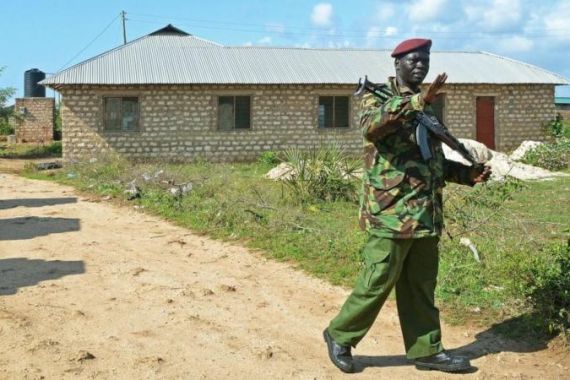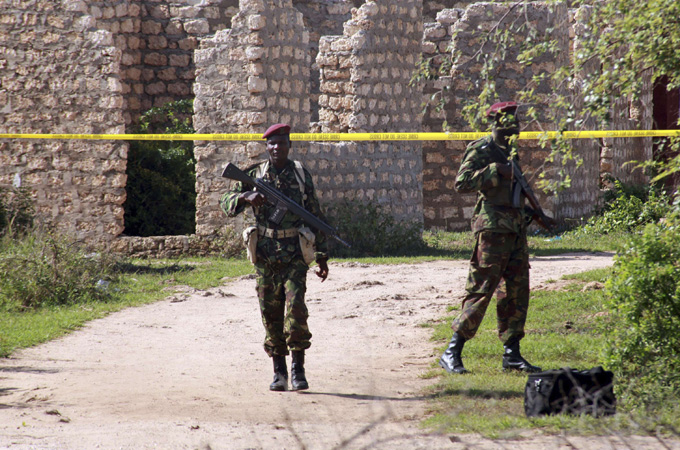Kenya police face ‘summary killing’ claims
Critics say the global ‘war on terror’ has legalised a culture of impunity among the country’s police forces.

Mombasa, Kenya – A ceiling fan turned slowly overhead as Laylatu Mohammed Omar and her family fell asleep on mattresses strewn across the floor to escape Mombasa’s searing heat. At 1am, they awoke to screeching cars and gunfire. Tear gas streamed inside through cracks in the door.
Two-hundred metres away, Saad Faraj was also awoken in his apartment. From his window he could see the shadows of anti-terrorism police, fanning out in the streets of Majengo, a suburb of Kenya’s second-largest city.
Saad received a call from his brother, Omar, a 40-year-old cashier at a butcher shop who lived next door to Laylatu.
“I’m being robbed,” Omar Faraj said, confusing the police for thugs.
|
“The Kenyan police are not equipped to investigate. When they fail to secure conviction in a court of law, they decide to eliminate.“ – Khelef Khalifa, Muslims for Human Rights |
“Just hide, they are everywhere,” Saad told him.
Saad realised his brother was the target of the police raid. For four hours, punctuated by bursts of shooting, Saad waited. When the squad cars pulled away at dawn, he rushed to Omar’s home.
Saad found his brother’s body on top of his wife, Rahma, who was unconcious but survived. Omar Faraj was shot in the head at close range, and brain matter spilled out of his skull. A suspected terrorist – intercepted the day before carrying grenades on a bus – led police to the home. He was also killed in the raid.
Though the police report described the incident as a shootout, testimony from neighbours indicated the firefight was one-sided.
Critics say the October shooting of Omar Faraj – whom police allege possessed weapons and was planning a “terrorist” act – was the latest in a series of extrajudicial killings and disappearances linked to Kenyan police trying to root out “terrorist” cells.
“This trend really worries us,” says Khelef Khalifa, director of Muslims for Human Rights. “The Kenyan police are not equipped to investigate. When they fail to secure conviction in a court of law, they decide to eliminate.”
In April, the Muslim cleric Samir Khan was abducted with a blind colleague, Mohammed Kassim. Khan’s mutilated body was discovered in a national park outside Mombasa. Kassim is still missing.
In August, the assassination of high-profile cleric Aboud Rogo, with suspected ties to al-Shabab fighters, sparked two days of violent riots in the coastal city.
It is believed by some that the covert Anti-Terror Police Unit is behind the killings and abductions, but the police deny responsibility.
The anti-terror operations have terrified Kenya’s Muslim population. “We are living in fear,” Laylatu said. “We are afraid we might be next.”
Anti-terror bill empowers police
Five-hundred kilometres away from Mombasa in Nairobi, a radio crackled to life inside a security guard’s watch post. “Six are dead and at least 10 more wounded after an explosion in a minibus in the Somali neighborhood of Eastleigh.”
“It is al-Shabab retaliating,” said Daniel Otieno, a security guard from Nairobi. After Kenyan troops were deployed to Somalia last October, grenade attacks have become commonplace in Kenya, exploding in churches and bus stops, often on Sundays. Most Kenyans, in step with the government and media, attribute attacks to the al-Qaeda-linked group.
Less often reported are the counter-attacks. After each explosion, angry mobs wielding machetes and stones descend upon Eastleigh, looting Somali businesses and homes – signs of the growing anti-Somali sentiment that threatens to alienate millions of Kenyan citizens and residents of Somali origin.
The need to defend against al-Shabab allowed Kenyan parliamentarians to pass stringent anti-terrorism legislation in mid-October. For the past eight years, an organised opposition blocked its signing on four separate occasions, claiming it provided the police unchecked power.
 |
| Kenya’s General Service Unit police officers on patrol [Reuters] |
With the passing of the anti-terrorism bill and troops in Somalia, Kenya has become a full-fledged partner in the so-called international fight against terrorism, securing millions of dollars of US State Department funding and intelligence support.
“One of the motivations in invading Somalia was to become indispensable,” said Maina Kiai, a prominent Kenyan human rights activist. “Now the government can do whatever they want.”
Kiai said he fears the anti-terror legislation has simply legalised a culture of impunity, recklessly enabling what he calls a “rogue” police force. The bill makes it difficult for Faraj’s family to challenge the police.
The crisis of policing in Kenya is not just marked by excessive use of force – large parts of the country are beyond the police’s control. On November 17 in the arid Suguta Valley of northern Kenya, cattle rustlers gunned down more than 40 officers in an ambush, described by police spokesman Eric Kiraithe as a “tactical miscalculation”.
A wanted man?
The police, regularly ranked by Kenyans as the most corrupt government body, have been slow to implement reforms aimed to improve accountability.
Despite widespread mistrust, Kenyan media and civil society have been uncharacteristically silent when it comes to the police’s anti-terror operations. “It is schizophrenic how we believe them when it comes to security issues,” said Kiai.
Three weeks after his death, Omar Faraj’s brother, colleagues, and friends still ask the same question: “Why didn’t the police just arrest him?” Faraj was predictable. Always on foot, he moved between his home, the butcher shop, and the Memon Villa mosque, his friends said.
|
“We will continue handling these operations until we root out all of the bad elements in our society.” – Aggrey Adoli, police chief |
“The assertion that he was a wanted criminal is a lie,” said one man who prayed with Faraj, requesting anonymity. “Where had they been searching for him? In which country?”
After evening prayers, once the floors of the mosque were swept and the great wooden doors bolted shut, he sat on back the steps and recounted a recent trip he had taken with Faraj to attend a conference on Islam in Nairobi. After it ended, they spent 40 days making their way back to Mombasa, sleeping and preaching in mosques along the highway.
Nearby at the Coast Province Police headquarters, in an office bigger than Omar Faraj’s entire apartment, Chief Aggrey Adoli declined to comment specifically on the case.
“We will continue handling these operations until we root out all of the bad elements in our society,” Adoli said.